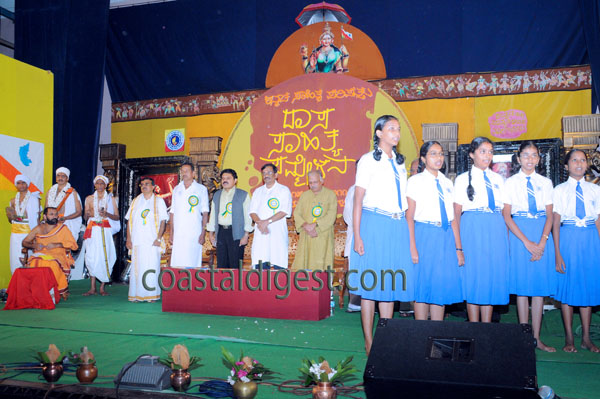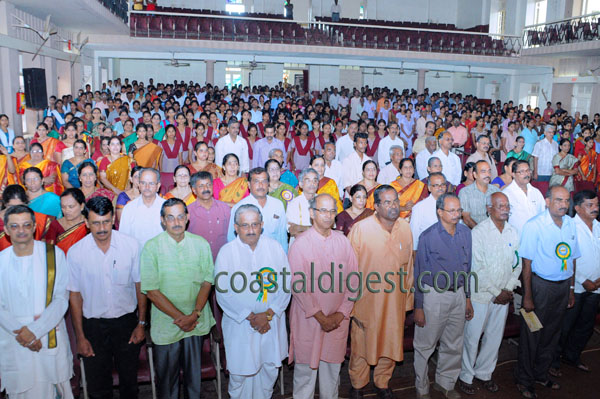
Mangalore, July 14: In what appears to be a violation of protocol, Vidyaprasanna Theertha Sripadangalavaru of Subrahmanya mutt has shown disrespect to the State-anthem at a State level Dasa Sahitya Sammela which was commenced at Town Hall here on Thursday.
Seer was present at the programme to 'grace the occasion' in the absence of Pejavara mutt pontiff Vishweshatheertha seer.
The seer was stuck to his adorned chair not bothering to stand up as a mark of respect even as the naada geete (state anthem) was being sung by a group of students before commencing the programme.
Interestingly, the violation took place right under the nose of the Kannada literateurs and the custodians Kannada Sahithya Parishath including its former President Harikrishna Punaroor, President Nallur Prasad and DK District President Pradeep Kumar Kalkura. It was only guests on the stage and the audience who stood up when Nada Geethe was sung even without the master of ceremony requesting the people to do so.
As part of Kuvempu's birth centenary celebrations, the then State Government led by SM Krishna had officially declared Kuvempu's poem 'Jai Bharatha Jananiya Thanujathe' as Naada Geethe. In the order passed then, it was clearly stated that while the Naada Geethe is sung, those present must stand up in respect.
This violation has once again raised serious doubts among common people that Swamijis do not come under the jurisdiction of law.
It may be noted that the issue of adopting the poem as State-anthem had sparked off a controversy when the Government earlier decided to adopt the version of the poem without the reference to Madhwacharya.
Though Kuvempu's writer-son, KP Poornachandra Tejaswi, who was known for his radical views had opposed to any move to include the name of Madhwacharya in the Naada Geethe, two of the seers of Madhwa Mutts in Udupi- Vishvesha Tirtha Swamiji of Pejawar Mutt and Suganendra Tirtha of Puttige Muth-had adamantly demanded for the inclusion of name of Madhwacharya.
It was Harikrishna Punaroor who first protested against the exclusion of the name of Madhwacharya from the Nada Geethe.
Ironically, the very same Vidyaprasanna Theertha Sripadangalavaru also belongs to one of Madhwa Mutts and believes the philosophy of Madhwacharya!
Government programme or religious programme?
Interestingly, though Sammelana was a government sponsored convention, it had a religious touch with Dharmasthala Dharmadhikari Dr D Veerendra Heggade being the guide of whole programme and with the blessings of Pejavara Mutt and Vishwa Hindu Parishath Chief MB Puranik as one of the guests.






Comments
Add new comment